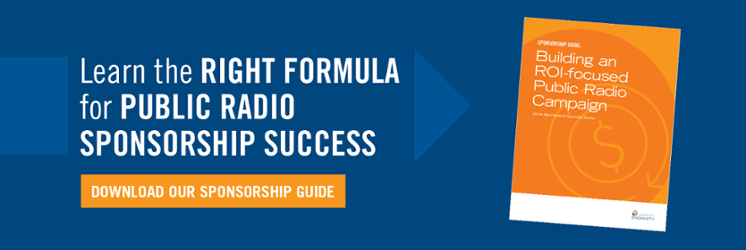FCC Guidelines for Public Media Sponsorship: How to Tailor Your Message
Believe it or not, FCC (the Federal Communications Commission) guidelines for public radio sponsorship can be a benefit to your messaging. This is because listeners can trust that public media sponsors will be held to a higher standard than commercial ads, guided by policies that guarantee only factual information that flows seamlessly with public radio's noncommercial nature.
In fact, it's the very reason public radio not only attracts very loyal listeners but millions a week. According to Pew Research, as many as 26 million listeners tune in to public radio per week, with over a thousand NPR member stations broadcasting programming.
Here's what you need to know about FCC guidelines for public media sponsorship messages and how to tailor your message to them.
What are FCC guidelines for public media sponsorship?
FCC guidelines are rules and regulations provided by the Federal Communications Commission, regulating the communication of non-profit public media and prohibiting commercial advertisement on public broadcasting stations.
According to FCC sponsorship rules, you must:
- Announce any matter that is sponsored or paid for and by whom for "any matter for which money, service, or other valuable consideration is paid or promised to, or charged or accepted by such station."
- Disclose any exchange of money, service, or valuable consideration via broadcast with a sponsorship identification announcement. This is required at the time of the announcement.
Audiences react differently to FCC-guided public media sponsorship messages and commercial advertisements. Listeners stay tuned to learn more about public media sponsors because they associate them with the same trust they hold for the station, whereas commercial messages tend to be turned off if listeners hear more commercials than entertainment.
What are the misconceptions about public media FCC guidelines and message performance?
The biggest misconceptions about public media sponsorship performance are:
- FCC guidelines limit the success of your message (i.e., because sponsors cannot have a call-to-action or detailed product descriptions)
- Public media sponsorship messages don't perform as well as commercial ads
FCC guidelines actually help your message because listeners trust their favorite broadcast stations to be open and honest about sponsorships — unlike commercial ads that clutter radio and use every trick in the book to gain sales.
Despite the misconception that commercial ads would outperform a public media sponsorship message, NPR State of Sponsorship surveys find that 84% of listeners took actions in response to a sponsorship message.
What are the benefits of sponsoring public media, despite the guidelines?
Despite having guidelines to follow when sponsoring public media, there are many major benefits to consider. The two most important are the higher quality of brand recall you receive and the engaged audience that hears about it.
Less clutter - better brand recall
Public media is less cluttered with sponsorships than commercial radio, so listeners are more open to hearing about sponsorships read by their favorite hosts. Too many ads lead to getting lost in the clutter, while a few seamless sponsorship messages can make your brand more memorable among listeners, increasing brand recall when they're ready to make a purchase.
More engaged audience
Public media listeners are also more attentive and engaged than those who listen to commercial radio. This is because they have a more positive opinion of the host, programming, and sponsorships they're listening to. Research on public radio sponsorship ROI shows that 88% of listeners hold a higher opinion of public radio sponsors, and 75% would choose a public radio sponsor over a commercial advertiser given the option.
How can sponsors tailor their messages effectively?
Here are three tips to drafting effective public radio sponsorship messages:
1. Keep it short and sweet
Your sponsor message will only be about :15 seconds, so you want to make sure you're getting your message across in the allotted time. Remember that you must include your legal business name, and there should be no mention of opinions (from political support or opposition to any viewpoint on controversial topics).
2. Be factual but not overly promotional
Be sure to use language that factually describes your product or service but doesn't get too promotional. For instance, you can state that your product has two features and name them, but you will need to stay clear of words like "award-winning" or "best" when describing them. Make sure you aren't adding an explicit CTA.
3. Work with a public media partner
Since there are specific rules to consider when tailoring your message, working with a public media partner makes the process simple and your message more effective. This way, you can tap into their expertise for guidance throughout the process, ensuring you're aligned with the requirements and crafting your message with listeners in mind.
Whether you’re interested in sponsoring one of our public media stations or learning more about turnkey sponsorship representation for your station, we can help. Complete the form, and we’ll be in touch soon.
Subscribe
Every week we share insights, industry news or best practices on public media sponsorship. Receive a weekly digest of our latest blog posts so you’re always in the know.
